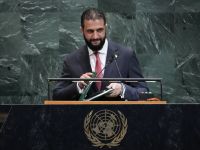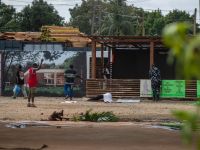The Lebanese Hizbollah Party has asked Palestinian groups to provide it with an authentic list of Palestinians in Israeli prisons in anticipation of a probable exchange of prisoners with Israel, according to Hussam Arafat, the West Bank leader of the Popular Front for the Liberation of Palestine-General Command, a Damascus-based opposition Palestinian faction.
Arafat said that a central committee in Damascus comprising PFLP-GC, the Islamic Jihad and Hamas is coordinating work with their people in Palestine to come up with lists “that exclude none.”
Hizbollah has seized four Israeli soldiers including a colonel, and is negotiating with Israel through mediators to hand them over in return for Lebanese and Arab prisoners.
Arafat said that although no joint command of the Intifada has officially been announced, there is coordination between the PNA and all the political powers in Gaza Strip and the West Bank.
Following is the full text of the interview:
Q: What are the arrangements agreed on with Hizbollah regarding the Palestinian prisoners?
A: The moment it was announced that Hizbollah had seized three Israeli soldiers, feelings of hope and optimism rose regarding the question of Palestinian prisoners in Israel. The movement received many lists naming our prisoners in Israeli prisons, particularly from the Fateh movement and the Palestinian National Authority. In order to have a clear picture of the issue, Hizbollah decided to form a committee comprising three parties to be entrusted with the task of providing information on the prisoners in case a swapping of prisoners takes place between Israel and the movement.
The committee is comprised of the Popular Front for the Liberation of Palestine, General Command, Hamas Movement and the Islamic Jihad. At first, a central committee based in Damascus undertook the communications with Hizbollah, then a tripartite committee was formed here to receive lists and send them to the central committee in Damascus which, in turn, passes them to Hizbollah.
Work has already started and we have contacted all parties concerned including the 1948 Palestinians and organizations concerned with Arab prisoners.
Q: How many prisoners are included in the lists so far?
A: It is not clear because we have not received Fateh’s lists, but we know that there are between 1,600 and 1,800 Arab and Palestinian prisoners in Israeli jails.
Q: Have you asked Fateh to provide you with its list?
A: Yes we have. I personally contacted Marwan Bargouthi and Sakher Habash among the other leaders.
Q: Have they shown cooperation?
A: There has not been cooperation, and I think they dealt with this issue from a political perspective. Apparently, they do not want to deal with the issue through this committee, a matter which will harm the prisoners’ case, in my opinion.
Q: Is it possible that they will not issue their lists?
A: So far it is not clear, but most probably they will have to hand the lists over to the committee under pressure from their prisoners.
Q: Their efforts exerted in Palestine to form a unified command for the Intifada, and a general orientation towards a national unity, hasn’t that had its impact on facilitating the work of the prisoners’ committee?
A: I am a member of the National Command, which has not been officially formed due to wide differences between the parties involved. However, there has been a certain formula through nationalist and Islamic powers which allows joint statements to be issued.
As for the prisoners’ committee, it was not something that we invented. It was a demand by Hizbollah that we responded to whatever was our opinion on the composition of the committee.
My personal wish is that other parties be represented in the committee including Fateh, PFLP, DFLP and the rest of the [PLO] factions. However, over the last ten years, Palestinian prisoners were classified [by the Israeli authorities] into categories: those who have blood on their hands who do not deserve to be released, and those who support the peace process, and those who do not. As a consequence, Fateh and the PNA have in many cases drafted lists that excluded Islamists.
I think that Hizbollah’s philosophy behind the formation of the committee was that trustworthy parties provide authentic lists that do not exclude any one. [Hizbollah’s secretary general Hassan] Nasrallah has said on the TV “we will not exclude anyone in the swapping.”
What concerns us at the end of the day is our prisoners, and I wouldn’t mind if Satan himself comes and releases them.
Q: You talked about problems facing the formation of a unified command of the Intifada. Could you elaborate on that?
A: In fact, the difficulties are technical. We are meeting on a daily basis, so are the people in Gaza, but there is the geographical problem and the political, social and economic differences between Gaza and the West Bank. Also, there have been differences between Hamas and Fateh. Both organizations, for example issued seperate statements calling on people to join different activities.
However, because we have experience from the first Intifada, we know that disparities like these lead to confusion, therefore, pressure has also been put on following recent meetings between political powers. Finally, it was agreed that activities be arranged jointly, while each group can issue statements concerning its political stands.
There has been talk on a command parallel to the PNA, but there was no solid agreement on that although in Jerusalem the command has been officially formed and there are statements signed in its name.
Q: The Palestinian people are experiencing an unprecedented state of national unity. Are there contacts between PFLP-GC and the other Damascus-based Palestinian factions?
A: There are no official contacts with the PNA or the factions, but we attended a meeting that brought together the PNA and all the factions in Gaza and we have no objection to attending the next planned meeting. Our position now is that the PNA and the opposition are in one trench, and we have no plans to focus on points of differences. We, the authority, the police and the security services, the political powers, and all the people are one front, and we have no objection to official contacts with the PNA.
Q: As a member of the unified command, what do you say about certain events that have just happened including the killing of two Israeli soldiers in this way, and the attempt to burn down a Jewish synagogue and the arson attacks on restaurants in Gaza. Do you think that the PNA has lost control over demonstrators as happened in the pervious Intifada?
A: We cannot interpret these events as a loss of control. I was an eyewitness to the killing of the Israeli soldiers. Maybe there are reservations on the killing politically, but there should be no regret over that if we know that had these soldiers succeeded in carrying out their plot, a massacre could have happened in Ramallah.
You can imagine a town like Ramallah that is under tight siege that none can enter. How could four soldiers be there?
At the entrances of the city, no Israeli or Arab car is allowed in; neither water nor food is allowed. It was only by accident that a Ramallah citizen and a policeman saw the muzzle (end) of a gun with one of the undercover soldiers, who were then arrested.
Confirmed information says that they were plotting to assassinate the leaders of Hamas and Fateh. Had the plan been implemented, or had they bombed a car in the city, a civil war might have broken out. Therefore the reaction from the people was to be expected in a situation like this.
Although we are against the exaggerated way in which the killings were conducted, I say this is war and you can expect anything in a war. Anyway, the political powers said at the meeting yesterday that the role played by the undercover Israeli agents should be highlighted.
As to the burning of the synagogue and the events in Gaza, we have heard what Hamas said, and I believe that these actions are the work of the Fifth Column, and definitely masterminded by certain Israeli parties in an attempt to undermine the Palestinian resistance by all means. There is a consensus among the PNA and the political powers that the Israeli security services are behind these acts.
© 2000 Al Bawaba (www.albawaba.com)







